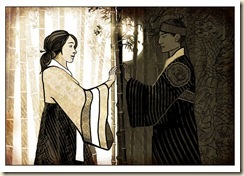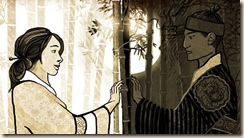"Notes on a Page" began life as a flash-length story written for a contest over at the Codex Writers' Group called Weekend Warrior. You're given several prompts Friday night and have until Sunday night to write a flash story using one of them. One of the prompts last year was to write a story in which someone finds a secret passage in a public building. At the time, I had just been offered an internship working in an orchestra library, and that inspired my take on the prompt: a portal in an orchestra hall that quite literally takes one inside the music.
night to write a flash story using one of them. One of the prompts last year was to write a story in which someone finds a secret passage in a public building. At the time, I had just been offered an internship working in an orchestra library, and that inspired my take on the prompt: a portal in an orchestra hall that quite literally takes one inside the music.
I realized two things very quickly with the story: 1) it didn't want to stay at flash length, and 2) my protagonist's internal conflict was pretty weak. My first draft involved her wanting to have learned to play violin, but she had been pressured into learning oboe instead—not a particularly compelling problem. Luckily, my orchestra internship came to the rescue and inspired a more interesting angle.
The more I spent my work hours scrutinizing and marking up scores and parts, the more I thought about how, even though most of us experience music on an emotional level, there's often this amazingly complex level of technical detail beneath it all. But technical perfection, while impressive, usually isn't emotionally satisfying. As a result, sometimes a musician will be criticized for being technically proficient but lacking in personality or feeling. Similarly, we'll often forgive technical imperfection because of the emotional effect achieved. As a performer, it can be a difficult balancing act—how do I invest the music with emotion while still staying on pitch and in  tempo and hitting all the right notes with the right rhythm and the right articulation?
tempo and hitting all the right notes with the right rhythm and the right articulation?
For this story, I decided to carry the technical perfection vs. feeling conflict a performer faces to an extreme with a character who was an odd duck because her passion was rooted in technical perfection, because she didn't understand or know how to achieve the sense of feeling that others demanded from her. I think that made for a far more intriguing dilemma than the first draft's "my parents wouldn't let me play the violin" angle.
And perhaps using Beethoven's ninth symphony in the story was the obvious choice given the ironic resonance the final movement's "Ode to Joy" text would have for my protagonist, but . . . well, it just felt right.
--Barbara A. Barnett



